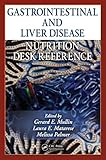Gastrointestinal and liver disease nutrition desk reference /
Publié par : CRC Press, (Boca Raton, FL :) Détails physiques : xv, 489 pages : illustrations ; 27 cm ISBN :9781439812648; 1439812640.| Type de document | Site actuel | Cote | Statut | Date de retour prévue | Code à barres | Réservations |
|---|---|---|---|---|---|---|
| Livre | La bibliothèque des Sciences Médicales et Pharmaceutiques | 616.330654 MUL (Parcourir l'étagère) | Disponible | 0000000026225 |
Includes bibliographical references and index.
Major components of the gastrointestinal system and their role in digestion -- Malabsorption -- Role of the gut microbiota and probiotics in gastrointestinal disease prevention and management -- Short bowel syndrome -- Celiac disease -- Food allergy and food intolerance -- Anatomy and physiology of the liver -- Nutrition and alcoholic liver disease -- Nutrition and nonalcoholic and viral liver diseases -- General nutritional guidelines for liver disease, cirrhosis, and its complications -- Nutrition and liver transplantation -- Nutritional considerations in acute and chronic pancreatitis -- Nutrition in irritable bowel syndrome -- Inflammatory bowel disease -- Nutrition and colorectal disease -- Nutrition and colorectal cancer -- Influence of bitter, aromatic, and pungent medicinal plants on gut function -- Obesity and nutrition -- Micronutrients -- Role of fiber, prebiotics, and probiotics in gastrointestinal health and disease -- Overview of genomics and gastrointestinal health and disease -- Enteral access and enteral nutrition -- Parenteral nutrition -- Pediatric enteral and parenteral nutrition -- Drug-drug and drug-nutrient interactions in gastrointestinal disease -- Nutrition assessment -- Critical care nutrition -- Perioperative nutrition support -- Bariatric surgery -- Home parenteral nutrition (HPN) -- Integrative nutrition approach to eating disorders -- Ethical and medical-legal considerations.
"While the gastrointestinal tract ingests, digests, and absorbs nutrients, the liver transforms nutrients, synthesizes plasma proteins, and detoxifies bacteria and toxins absorbed from the gut. It is therefore not surprising that gastrointestinal and hepatic diseases have a major impact on the nutritional state of the individual. Integrating nutrition and the gastrointestinal system, the Gastrointestinal and Liver Disease Nutrition Desk Reference brings together experts in the field of nutrition, gastroenterology, and hepatology to offer dietary, nutritional, and natural therapies for gastrointestinal and hepatic ailments in order to improve overall health. Providing a review of the digestive tract, liver, and core concepts, this important reference presents the nutritional consequences and considerations of digestive disorders. Contributors examine the role of nutrition in gastrointestinal and liver disease, including alcoholic and nonalcoholic liver disease, viral hepatitis, cirrhosis, malabsorption, colorectal disease, transplantation, pancreatitis, and inflammatory bowel disease. Of special interest to the practitioner are chapters on food allergy and intolerance, the effects of medicinal plants, and the role of fiber in the gastrointestinal tract. The reference also addresses the challenges of managing nutritional issues for hospitalized patients, and covers eating disorders and ethical issues. Other key topics include:ObesityClinical applications of probioticsThe impact of micronutrient deficiencies Genomic applications for gastrointestinal careDrug-drug and drug-nutrient interactionsGuidelines for performing a nutrition assessmentThis comprehensive reference offers a toolbox of key concepts, charts, tables, algorithms, and practical therapeutic strategies for practitioners involved in gastrointestinal and hepatic nutrition care"--Provided by publisher.
"Preface The gastrointestinal tract is concerned with ingesting, digesting, and absorbing nutrients and the liver is a metabolic engine that transforms nutrients, synthesizes plasma proteins, and detoxifies bacteria and toxins absorbed from the gut. It is therefore not surprising that gastrointestinal and hepatic diseases have a major impact on the nutritional state of the individual. The text is easily referred to, integrating the gastrointestinal tract and nutrition, and is a valuable addition to the literature of the practicing gastroenterologist. The desk reference is edited by Dr. Gerard Mullin, who directs the integration of nutrition and gastrointestinal disease at Johns Hopkins Medical Centre, Dr. Laura Matarese, who directs the nutritional care of persons who are undergoing intestinal rehabilitation or have undergone bowel transplant at the University of Pittsburgh, and Dr. Melissa Palmer, the medical director of hepatology at New York University in Plainview. They have track records and current interests suited to such a reference. The book has a total of 32 chapters. The chapters cover a range of topics relevant to being a reference integrating nutrition with gastrointestinal disease. Three chapters, entitled "Major Components of the Gastrointestinal System and their Role in Digestion," "The Role of the Gut Microbiota and Probiotics in Gastrointestinal Disease Prevention," and "Anatomy and Physiology of the Liver," give the reader an understanding of the normal state. Other sections cover the role of nutrition in gastrointestinal and liver disease, including alcoholic and nonalcoholic liver disease, malabsorption, colorectal disease, transplantation, pancreatitis, and inflammatory bowel disease"--Provided by publisher.


Il n'y a pas de commentaire pour ce document.